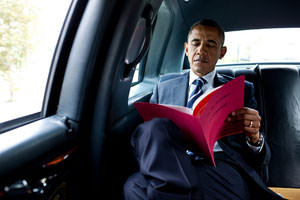Obama: The Conservative in 2012
The GOP is engaged in a wholesale effort to redefine the government help that Americans take for granted as an effort to create a radically new, statist society.
At a moment when the nation wonders whether politicians can agree on anything, here is something that unites the Republican presidential candidates — and all of them with President Obama: Everyone agrees that the 2012 election will be a turning point involving one of the most momentous choices in American history.
True, candidates (and columnists) regularly cast the impending election as the most important ever. Campaigning last week in Pella, Iowa, Republican Rick Santorum acknowledged as much. But he insisted that this time, the choice really was that fundamental. “The debate,” he said, “is about who we are.”
Speaking not far away in Mount Pleasant, Newt Gingrich went even further, and was more specific. “This is the most important election since 1860,” he said, “because there’s such a dramatic difference between the best food-stamp president in history and the best paycheck candidate.” Thus did Gingrich combine historic sweep with a cheap and inaccurate attack. Nonetheless, it says a great deal that Gingrich chose to reach all the way back to the election that helped spark the Civil War.
Mitt Romney was on the same page in a speech in Bedford, N.H. “This is an election not to replace a president but to save a vision of America,” he declared. “It’s a choice between two destinies.” Sounding just like Santorum, he urged voters to ask: “Who are we as Americans, and what kind of America do we want for our children?”
Obama could not agree more. “This is not just another political debate,” the president said in his theme-setting speech in Osawatomie, Kan., earlier this month. “This is a make-or-break moment for the middle class, and for all those who are fighting to get into the middle class.”
On this one, Santorum, Gingrich, Romney and Obama all have it right. For the first time since Barry Goldwater made the effort in 1964, the Republican Party is taking a run at overturning the consensus that has governed American political life since the Progressive era.
Obama is defending a tradition that sees government as an essential actor in the nation’s economy, a guarantor of fair rules of competition, a countervailing force against excessive private power, a check on the inequalities that capitalism can produce, and an instrument that can open opportunity for those born without great advantages.
Today’s Republicans cast the federal government as an oppressive force, a drag on the economy and an enemy of private initiative. Texas Gov. Rick Perry continues to promise, as he did last week during a campaign stop in Davenport, Iowa, to be a president who would make “Washington, D.C., as inconsequential in your life as he can make it.” That far-reaching word “inconsequential” implies a lot more than trims in budgets or taxes.
The GOP is engaged in a wholesale effort to redefine the government help that Americans take for granted as an effort to create a radically new, statist society. Consider Romney’s claim in his Bedford speech: “President Obama believes that government should create equal outcomes. In an entitlement society, everyone receives the same or similar rewards, regardless of education, effort and willingness to take risk. That which is earned by some is redistributed to the others. And the only people who truly enjoy any real rewards are those who do the redistributing — the government.”
Obama believes no such thing. If he did, why are so many continuing to make bundles on Wall Street? As my colleagues Greg Sargent and Paul Krugman have been insisting, Romney is saying things about the president that are flatly, grossly and shamefully untrue. But Romney’s sleight of hand is revealing: Republicans are increasingly inclined to argue that any redistribution (and Social Security, Medicare, student loans, veterans benefits and food stamps are all redistributive) is but a step down the road to some radically egalitarian dystopia.
Obama will thus be the conservative in 2012, in the truest sense of that word. He is the candidate defending the modestly redistributive and regulatory government the country has relied on since the New Deal, and that neither Ronald Reagan nor George W. Bush dismantled. The rhetoric of the 2012 Republicans suggests they want to go far beyond where Reagan or Bush ever went. And here’s the irony: By raising the stakes of 2012 so high, Republicans will be playing into Obama’s hands. The GOP might well win a referendum on the state of the economy. But if this is instead a larger-scale referendum on whether government should be “inconsequential,” Republicans will find the consequences to be very disappointing.
E.J. Dionne’s e-mail address is ejdionne(at)washpost.com.
© 2011, Washington Post Writers Group
Your support matters…Independent journalism is under threat and overshadowed by heavily funded mainstream media.
You can help level the playing field. Become a member.
Your tax-deductible contribution keeps us digging beneath the headlines to give you thought-provoking, investigative reporting and analysis that unearths what's really happening- without compromise.
Give today to support our courageous, independent journalists.






You need to be a supporter to comment.
There are currently no responses to this article.
Be the first to respond.